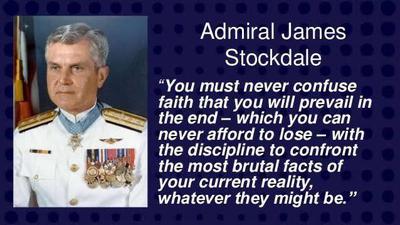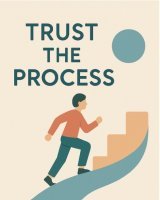The Stockdale Paradox
How To Deal With The Attrition Factor
When it just goes on and on and there is no end in sight...
What Is The Stockdale Paradox?
The Stockdale Paradox is named after the late James Stockdale, former vice presidential candidate, naval commander and prisoner of war during the American-Vietnam war.
It became well known having been featured in author and business guru Jim Collins’ book “Good To Great” following extensive interviews between Collins and Stockdale exploring how Stockdale survived 8 years of imprisonment and torture.
Collins’
specific focus was to identify the principles that underpinned
Stockdale’s survival and emergence at the end of the war as not only
unbroken but as source of practical inspiration.
Balancing realism and optimism in a dire situation is a key to survival and success
What
the Stockdale Paradox means is that in times of prolonged and seemingly
never-ending hardship, set-backs, suffering and distress we need to
maintain optimism that we will survive and pull through, and yet at the same time balance that with a total realism and practicality about the harsh present realities.
In Stockdale’s own words:

Paraphrased to its core:
Hope for the best, but acknowledge and prepare for the worst.
Such
paradoxical thinking is one of the defining philosophies of many who
have made it through severe hardship and eventually reached their goals.
The stockdale paradox offers a balanced approach to surviving hard times that seem to go on and on, with no end in sight.
Suffering IS an integral part of the human condition . It is as though there is an inbuilt design flaw that ensures that we all suffer at some point, one way or another.
Right now, at time of writing, we are all suffering in some way as we come to terms with the aftermath of the Covid pandemic and the Russia-Ukraine war and increasing economic and financial hardships.
The Stockdale Paradox - Coping With The Attrition Factor

Many, maybe most, of us are capable of coping with challenges and difficulties in the short to medium term.
But
in my experience once a challenging situation drags on beyond the one
year mark we start to flag, and after two years – with no end in sight –
it gets really tough.
This is what I call the attrition factor.
It is this point that we need to apply the Stockdale Paradox.
This
means that in addition to maintaining a hope for the future and a
pragmatic realism about the present you need to do 3 further things:
(1) Find a way of dealing with the emotional side of your pragmatic realism.
- There are times when there is nothing more we can do to alleviate the situation. In these circumstances we have two powerful options: we can resist it or we can accept it.
- The biggest key to all this is to behave and respond in ways that may be completely alien to us by allowing and cultivating a very deep acceptance of what is happening and acknowledging that we are not in control of circumstances and - counter cultural and counter intuitive as this sounds - to go with the flow.
- The more we can surrender to the flow then the more we automatically become aligned to a far greater dimension of our consciousness than we may have ever previously experienced - this really is the key.
- It is this alignment with the flow that is the dynamic that will pull us through this difficult situation and it is this alignment that is the source of our self-motivation through and beyond present difficult circumstances.
- Whether we realise it or not, whether we accept it or not, there is always a spiritual - or energetic - dynamic at work in these situations.
(2) Recognise and understand that you are not your thoughts.
- Our thoughts can drive us crazy, especially in these difficult situations that drag on, and on…
- We don’t have complete control over our instinctive emotions, they’re largely involuntary and that’s part of being human. What we do have, though, is control over how we choose to respond to those feelings.
- The key to this lies in understanding that:
- What matters is not the content of your thoughts but your relationship with your thoughts
- See here for practical guidance in dealing with your thoughts and here for further practical support in living with your thoughts.
(3) Transform your “dead time” into “alive time”
- In Recognising Limbo we talked about "dead time" vs "alive time" and I asked the question: “When you can’t work because you have no work, when you feel stuck and can see no way out of this situation, when you don’t even know if there is an end of the tunnel, what do you do with your time?”
- In difficult times like these, we can choose to just sit around and feel impatient, resentful, or angry.
- Or we can we can exercise control over our use of this time figure a way to solve a problem, reach a goal, or help someone else with these things.
- Dead time can be revived and transformed and used to our and others long term benefit. We can use this time to emerge from this overall situation a better and more resourceful person.
Next Article: Embrace Your Fear Of Failure And Uncertainty
Return from "The Stockdale Paradox" to: Walking The Talk
LATEST ARTICLES
Manifestation Without Magic: A Practical Model
 Manifestation without magic is not a softer or more intellectual version of popular manifestation culture. It is a different model altogether. Popular manifestation teachings tend to frame reality as…
Manifestation without magic is not a softer or more intellectual version of popular manifestation culture. It is a different model altogether. Popular manifestation teachings tend to frame reality as…Staying Committed When You Can't See Progress - The Psychology of Grit
 Uncertainty Is Not The Absence Of Progress, Only The Absence Of Reassurance. One of the most destabilising experiences in modern life is not failure, but uncertainty and staying committed when you can…
Uncertainty Is Not The Absence Of Progress, Only The Absence Of Reassurance. One of the most destabilising experiences in modern life is not failure, but uncertainty and staying committed when you can…The Battle For Your Mind - How To Win Inner Freedom In A Digital Age Of Distraction
 From External Events to Inner Events. We often think of “events” as things that happen out there: the traffic jam, the rude comment, the delayed email reply. But what truly shapes our experience is wh…
From External Events to Inner Events. We often think of “events” as things that happen out there: the traffic jam, the rude comment, the delayed email reply. But what truly shapes our experience is wh…How to See Your Thoughts Without Becoming the Story
 A Practical Guide to Thought-Awareness. You can spend your life inside the stories of your mind without ever learning how to see your thoughts clearly and objectively. Most of the stuff we tell oursel…
A Practical Guide to Thought-Awareness. You can spend your life inside the stories of your mind without ever learning how to see your thoughts clearly and objectively. Most of the stuff we tell oursel…The Collison Decision Matrix - A Simple Framework for Better Choices
 The Collison Decision Matrix Is A Practical Everyday Thinking Tool. Most of us spend a surprising amount of time worrying about decisions. From small ones such as what to wear, what to eat, what to te…
The Collison Decision Matrix Is A Practical Everyday Thinking Tool. Most of us spend a surprising amount of time worrying about decisions. From small ones such as what to wear, what to eat, what to te…The Power Of Asking The Right Question
 The Power Of Asking The Right Question Lies In The Quest For Insight. To experience the power of asking the right question you must develop the practice of asking questions. The best way to improve th…
The Power Of Asking The Right Question Lies In The Quest For Insight. To experience the power of asking the right question you must develop the practice of asking questions. The best way to improve th…Site Pathways
 Here is a site pathway to help new readers of Zen-Tools navigate the material on this site. Each pathway is based around one of the many key themes covered on this site and contain a 150 word introduc…
Here is a site pathway to help new readers of Zen-Tools navigate the material on this site. Each pathway is based around one of the many key themes covered on this site and contain a 150 word introduc…How To Live With Contradiction - Beyond Thought Let Stillness Speak
 A major impact on so many peoples' lives is the situational contradiction of unfilled realistic expectations. So where does all this leave us? Well here we are, with mental equipment that is more lim…
A major impact on so many peoples' lives is the situational contradiction of unfilled realistic expectations. So where does all this leave us? Well here we are, with mental equipment that is more lim…How To Trust The Process Of Mindfulness - Right Now
 In mindfulness, the process isn’t some distant goal — it's what is happening right now. When we talk about how to trust the process of mindfulness the credibility of the process is heavily dependent…
In mindfulness, the process isn’t some distant goal — it's what is happening right now. When we talk about how to trust the process of mindfulness the credibility of the process is heavily dependent…Inner Mastery For Outer Impact - Mental Clarity For Effective Action
 Insights only matter if they translate into consistent action. In a world crowded with quick fixes and motivational soundbites, the theme “Inner Mastery for Outer Impact” calls us to something more e…
Insights only matter if they translate into consistent action. In a world crowded with quick fixes and motivational soundbites, the theme “Inner Mastery for Outer Impact” calls us to something more e…The Wise Advocate - Helping You Achieve The Very Best Outcome
 The focus of your attention in critical moments of choice either builds or restricts your capacity for achieving the best outcome. When we talk of 'The Wise Advocate' its easy to think of the consigl…
The focus of your attention in critical moments of choice either builds or restricts your capacity for achieving the best outcome. When we talk of 'The Wise Advocate' its easy to think of the consigl…Trust The Process - Beyond The Cliche
 The phrase "trust the process" has become a cliche, the woo-woo mantra of the "self help" industry. Those three little words feel like they ought to mean something useful but hidden behind them are a…
The phrase "trust the process" has become a cliche, the woo-woo mantra of the "self help" industry. Those three little words feel like they ought to mean something useful but hidden behind them are a…
